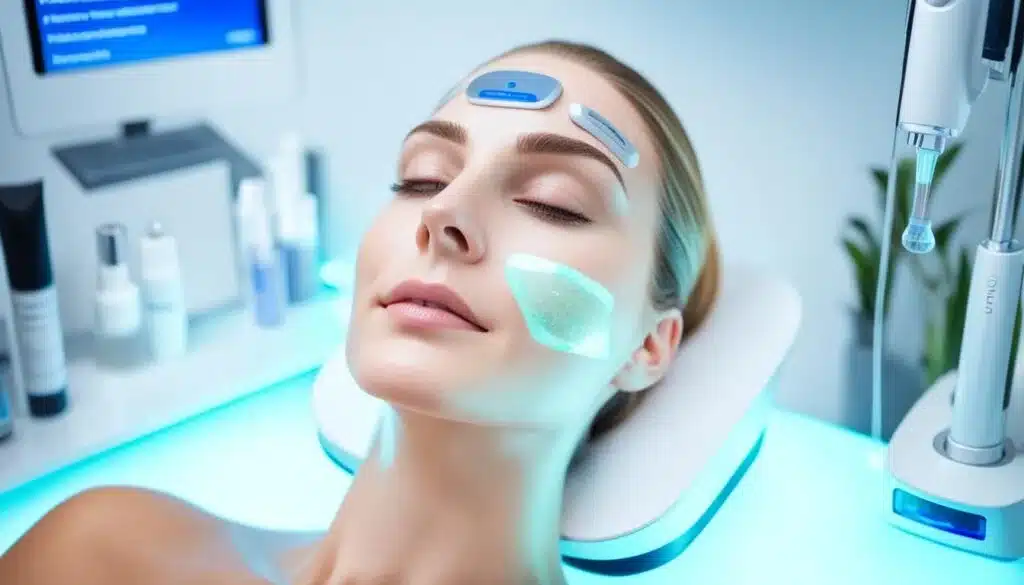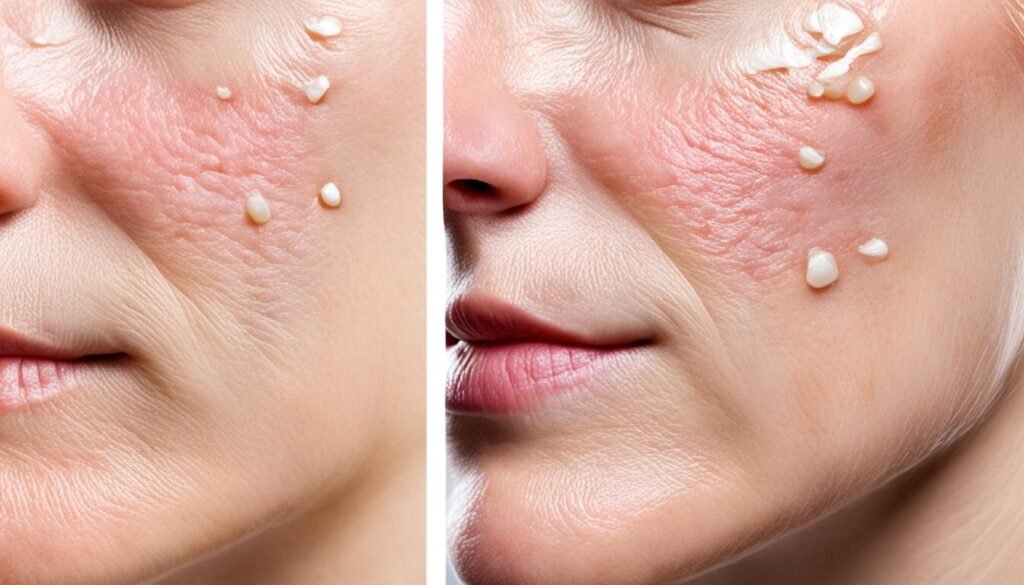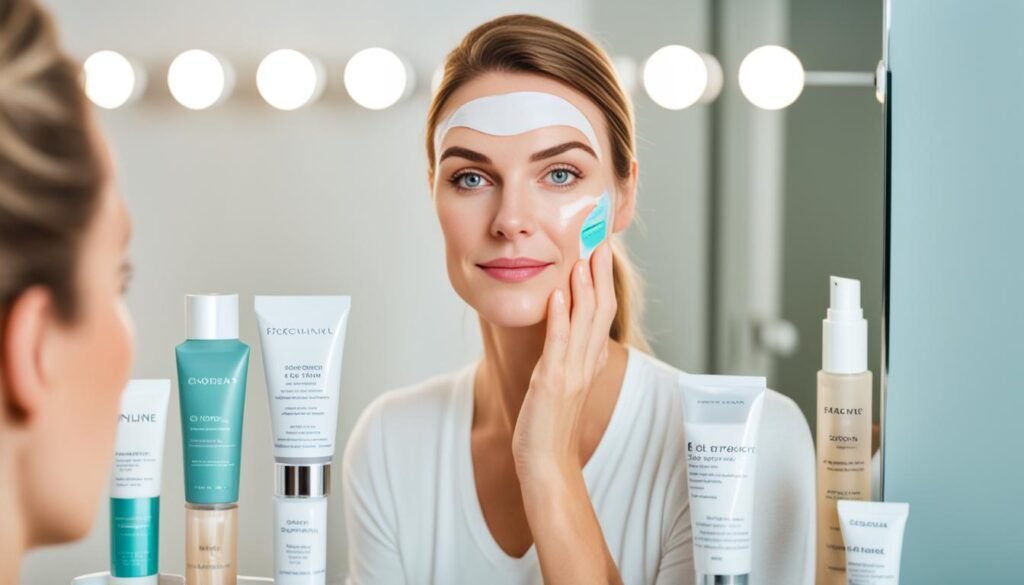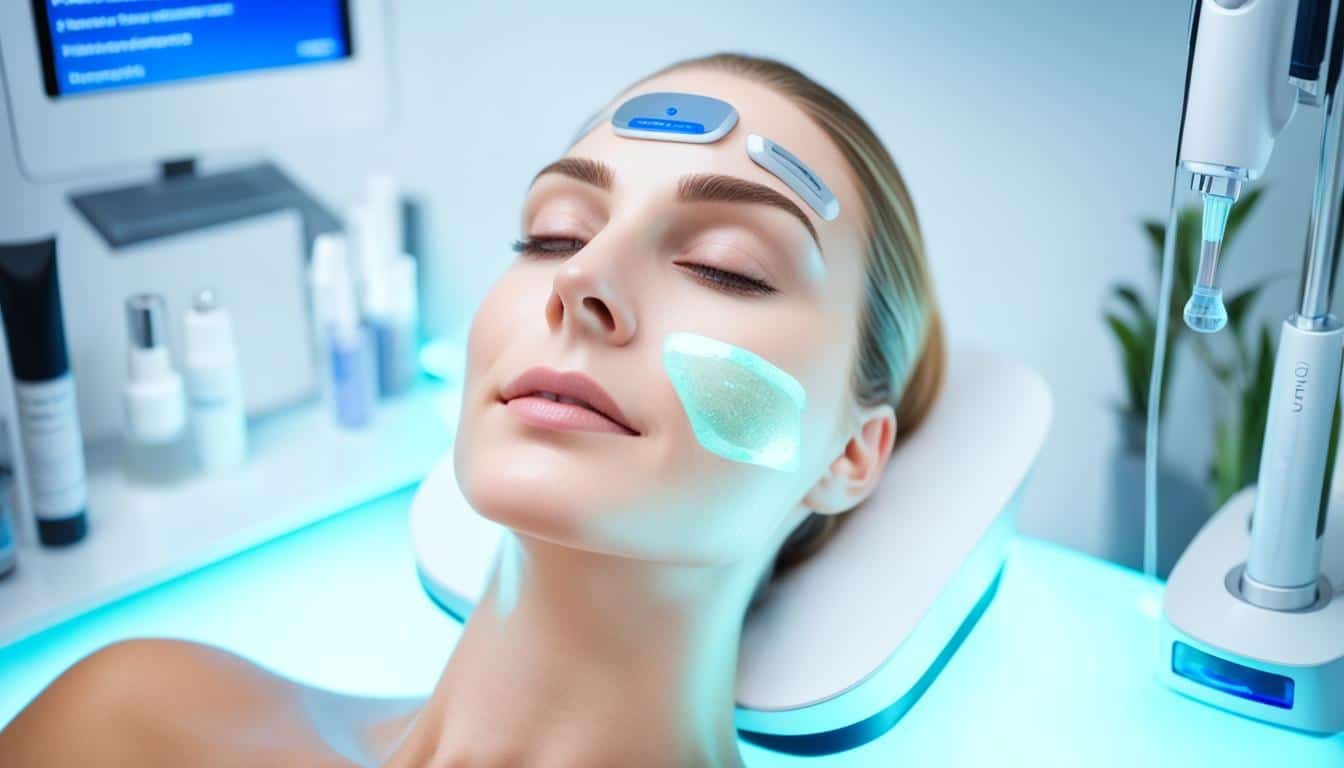How To Treat Acne Scars Acne often leaves behind scars that can be tough to deal with. But, there are ways to fix this. Knowing the types of scars and the right treatments is crucial for smoother skin.
There are many ways to treat acne scars, from home remedies to professional treatments. The best method depends on your skin type, scar severity, and goals. It’s smart to talk to a dermatologist for a plan that fits your needs.
Key Takeaways
- Acne scars can be effectively treated through a variety of methods, both at-home and professional.
- Understanding the different types of acne scars, such as atrophic and hypertrophic, is crucial for choosing the right treatment approach.
- At-home treatments like sunscreen and medicated creams can help improve the appearance of acne scars.
- Professional treatments, such as soft tissue fillers, laser resurfacing, and chemical peels, can provide more dramatic results for severe or stubborn acne scarring.
- Consulting with a board-certified dermatologist is recommended to develop a personalized treatment plan that addresses your specific skin concerns.
Understanding Different Types of Acne Scars
Acne scars can really affect how we feel about ourselves. Even after the acne goes away, the scars can stay. Knowing the different types of scars is key to finding the right treatment.
Atrophic or Depressed Acne Scars
Atrophic or depressed acne scars are the most common. They look like indentations in the skin. This happens when the healing process doesn’t make enough collagen, leaving the skin sunken or pitted.
These scars come in three main types:
- Boxcar scars: These are deep, wide depressions with clear edges.
- Ice pick scars: These are narrow and deep, looking like an ice pick made them.
- Rolling scars: These scars have a wavy look, making the skin uneven.
Hypertrophic or Raised Acne Scars
Hypertrophic or raised acne scars happen when the healing process makes too much collagen. This makes the scars stick out above the skin, giving it a bumpy feel. These scars are also called keloids, a type of scarring that can get bigger over time.
Knowing what kind of scar you have is important for finding the right treatment. By understanding the differences between depressed and raised scars, people can work with their dermatologists to find the best way to fix their skin.
At-Home Treatments for Acne Scars

If you want to fix acne scars at home, there are many over-the-counter options. At-home acne scar treatments and over-the-counter acne scar products can lessen the look of both deep and raised scars.
Look for products with alpha hydroxy acids (AHAs) like lactic acid. AHAs gently remove dead skin, fading scars and smoothing skin texture. Retinoids, such as retinol, also work well by boosting collagen production, making scars less noticeable.
Salicylic acid is another important ingredient that clears pores and lowers inflammation, which helps scars form. Remember, using a daily sunscreen is key to stop scars from getting darker.
For tough or deep scars, you might need professional treatments like chemical peels, laser treatments, or microneedling. But these at-home acne scar treatments can be a good first step to better your skin’s appearance.
How To Treat Acne Scars
Treating acne scars can be complex, needing a mix of professional treatments. These are chosen based on the skin type and scar type. Dermatologists offer many acne scar treatment options to make scars less visible and skin smoother.
Chemical peels are a common treatment. They remove the top skin layer, showing new, less scarred skin. Laser resurfacing is also popular. It uses light energy to break down scars and boost collagen for smoother skin.
Dermabrasion is a deep exfoliation that helps acne scars. It uses a device to sand the skin, making scars less visible. This process also evens out the skin texture.
Microneedling is a gentle dermatologist acne scar treatment. It uses fine needles to make small holes in the skin. This starts the healing process, increasing collagen and elastin to lessen scars.
Injectable fillers are another acne scar treatment option. They fill in depressed or indented scars, making the skin smoother. These treatments work well with others for the best results.
For the best results in treating acne scars, combining these treatments is often best. Working with a skilled dermatologist is key for lasting and effective results.
Treating Raised Acne Scars and Keloids

Acne scars come in different types, each needing its own treatment plan. Depressed or atrophic scars might be easy to treat. But raised acne scars and keloids are harder and need special care.
Raised or hypertrophic acne scars happen when too much collagen forms, making scars look bumpy. To fix these, doctors might use laser therapy, steroid injections, and creams. Laser treatments can make scars less visible by changing collagen. Steroid injections can flatten and soften the scars.
Keloid scars are hard to treat and grow bigger than the original wound. They often need a mix of treatments like injections, laser therapy, and surgery. Dermatologists use many methods to help manage these tough scars.
| Treatment Option | Effectiveness for Raised Acne Scars | Effectiveness for Keloid Scars |
|---|---|---|
| Laser Therapy | High | Moderate |
| Steroid Injections | High | High |
| Topical Medications | Moderate | Low |
| Surgical Removal | N/A | High |
Working with a dermatologist is key to finding the right treatment for raised acne scars, keloid acne scars, and hypertrophic acne scars. With the right approach, people can get smoother skin and feel more confident.
Acne Scar Treatment Considerations

When looking into acne scar treatments, there are several important factors to think about. Your dermatologist will look at the types of scars, how severe they are, and your skin type. They will suggest the best procedures based on this.
It’s also important to consider the cost, how long it takes to recover, and how much time the treatment needs. Each treatment has its own costs and recovery times.
Before starting any scar treatment, make sure your skin is clear of active acne. New breakouts can make scars worse. So, follow your dermatologist’s advice on getting your skin ready for treatment.
Factors to Consider for Acne Scar Treatment
- Scar type and severity
- Your skin tone and complexion
- Treatment cost and insurance coverage
- Downtime and recovery period required
- Overall time commitment for the procedure
- Stopping active acne breakouts before starting treatment
Thinking about these factors helps you work with your dermatologist to pick the best treatment plan. Following their advice before treatment is crucial for good results.
“Choosing the right acne scar treatment requires a thoughtful, personalized approach. Work closely with your dermatologist to ensure the process is smooth and the results meet your expectations.”
Also Read: Repair And Rejuvenate: The Ultimate Guide To Skincare For Sun Damaged Skin
Conclusion
Dealing with acne scars can be tough, but there are many ways to help. From skincare you can do at home to professional treatments, there’s something for everyone. It’s important to work with a dermatologist to find the best plan for your scars, skin, and goals.
Starting early can make a big difference in how your skin looks and feels. You might use products you can buy over the counter, try laser treatments, or combine different methods. The right approach can lessen the look of scars and boost your confidence.
Remember, treating acne scars takes time and effort. With the help of a knowledgeable dermatologist and sticking to your skincare routine, you can get the clear, glowing skin you want.
FAQs
Q: What is the most effective treatment for acne scars?
A: The most effective treatment for acne scars often includes laser treatment, which helps to remove the top layer of skin and improve acne scars.
Q: Can over-the-counter products help remove acne scars?
A: While over-the-counter products may help reduce the appearance of scars, the treatment of acne scars often requires more advanced options like laser treatment for significant improvement.
Q: How does laser treatment improve acne scars?
A: Laser treatment improves acne scars by targeting deeper scars and stimulating collagen production, which helps to reduce the appearance of scarring.
Q: What should I expect during a consultation for acne scar treatment?
A: A consultation for the treatment of acne scars begins with a thorough assessment of your skin, discussing your acne history, and determining the best treatment options for your specific type of scars.
Q: Is laser treatment a safe and effective treatment for acne scars?
A: Yes, laser treatment is considered a safe and effective treatment for acne scars, although individual results can vary based on skin type and the severity of scarring.
Q: Can I prevent new acne scars from forming?
A: Yes, preventing acne is key to avoiding new scars. Keeping acne under control with effective acne treatment and medications can significantly reduce the risk of scarring.
Q: What types of acne scars are most commonly treated?
A: Common types of acne scars that are treated include atrophic scars, such as ice pick and rolling scars, which tend to leave permanent marks on the skin.
Q: How long does it take to see improvement after starting treatment for acne scars?
A: The timeline for improvement can vary; however, many patients begin to see changes within a few weeks after starting treatment, with optimal results often visible after several sessions.
Q: Are there any non-invasive treatments available for acne scars?
A: Yes, non-invasive treatments such as chemical peels and microdermabrasion can help improve acne scars, although they may be less effective than laser treatments for deeper scarring.





